六年级上册英语常用表达法
六年级上册英语人教版第79页

六年级上册英语人教版第79页六年级上册英语人教版第79页的内容如下:Useful expressions 常用表达法Unit 1Where is the museum shop?博物馆的商店在哪儿?It's near the door.在大门附近。
How can we get there?我们怎么到那儿?Turn left at the bookstore.到书店左转。
Unit 2How do you come to school?你怎么来学校的?Usually,I come on foot.通常我走路来。
In the USA people on bikes must wear one.在美国骑自行车的人必须戴(头盔)。
Don't go at the red light!别闯红灯!I must pay attention to the traffic lights!我必须注意交通信号灯!Unit 3What are you going to do tomorrow?你明天打算做什么?I'm going to have an art lesson.我要上美术课。
We're going to draw some pictures in Renmin Park. 我们要到人民公园去画画。
Where are you going?你们打算去哪儿?We're going to the cinema.我们打算去电影院。
When are you going?你们什么时候去?Unit 4What are Peter's hobbies?彼得有什么爱好?He likes reading stories.他喜欢读故事。
Does he live in Sydney?他住在悉尼吗?No,he doesn't.不,他没有。
Does he like doing word puzzles and going hiking?他喜欢猜字谜和远足吗?Yes,he does.是的,他喜欢。
六年级上册词汇表及常用表达法
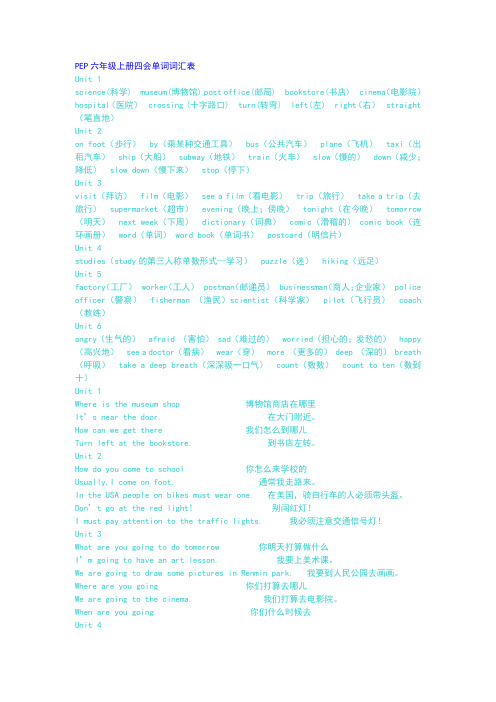
PEP六年级上册四会单词词汇表Unit 1science(科学) museum(博物馆) post office(邮局) bookstore(书店) cinema(电影院)hospital(医院) crossing (十字路口) turn(转弯) left(左) right(右) straight (笔直地)Unit 2on foot(步行) by(乘某种交通工具) bus(公共汽车) plane(飞机) taxi(出租汽车) ship(大船) subway(地铁) train(火车) slow(慢的) down(减少;降低) slow down(慢下来) stop(停下)Unit 3visit(拜访) film(电影) see a film(看电影) trip(旅行) take a trip(去旅行) supermarket(超市) evening(晚上;傍晚) tonight(在今晚) tomorrow (明天) next week(下周) dictionary(词典) comic(滑稽的) comic book(连环画册) word(单词) word book(单词书) postcard(明信片)Unit 4studies(study的第三人称单数形式—学习) puzzle(迷) hiking(远足)Unit 5factory(工厂) worker(工人) postman(邮递员) businessman(商人;企业家) police officer(警察) fisherman (渔民)scientist(科学家) pilot(飞行员) coach (教练)Unit 6angry(生气的) afraid (害怕) sad(难过的) worried(担心的;发愁的) happy (高兴地) see a doctor(看病) wear(穿) more (更多的) deep (深的) breath (呼吸) take a deep breath(深深吸一口气) count(数数) count to ten(数到十)Unit 1Where is the museum shop 博物馆商店在哪里It’s near the door. 在大门附近。
新版PEP小学英语六年级上册1-6单元知识点总结
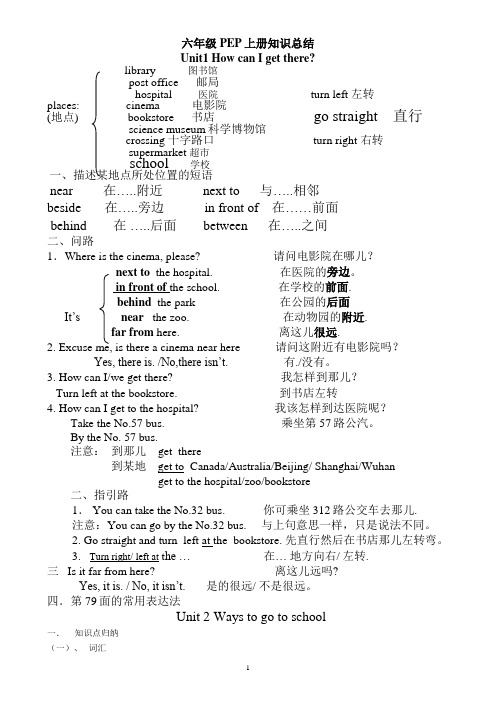
六年级PEP上册知识总结Unit1 How can I get there?library 图书馆post office 邮局hospital 医院turn left 左转places: cinema 电影院(地点) bookstore 书店go straight 直行science museum科学博物馆crossing 十字路口 turn right 右转supermarket 超市school 学校一、描述某地点所处位置的短语near 在…..附近 next to 与…..相邻beside 在…..旁边 in front of 在……前面behind 在…..后面 between 在…..之间二、问路1.Where is the cinema, please? 请问电影院在哪儿?next to the hospital. 在医院的旁边。
in front of the school. 在学校的前面.behind the park 在公园的后面It’s near the zoo. 在动物园的附近.far from here. 离这儿很远.2. Excuse me, is there a cinema near here 请问这附近有电影院吗?Yes, there is. /No,there isn’t. 有./没有。
3. How can I/we get there? 我怎样到那儿?Turn left at the bookstore. 到书店左转4. How can I get to the hospital? 我该怎样到达医院呢?Take the No.57 bus. 乘坐第57路公汽。
By the No. 57 bus.注意:到那儿 get there到某地 get to Canada/Australia/Beijing/ Shanghai/Wuhanget to the hospital/zoo/bookstore二、指引路1. You can take the No.32 bus. 你可乘坐312路公交车去那儿.注意:You can go by the No.32 bus. 与上句意思一样,只是说法不同。
pep六年级英语上册Unit 4—Unit 5重点单词和句型

常用表达法(Unit 4 & Unit 5)Unit 41.What are your _________? 你的业余爱好是什么?2.I _______ _________ stories. I also ______ ________ and ________ kung fu.我喜欢读故事。
我还喜欢唱歌和练武术。
3.Two students ______ __________. One student _______ singing.两个学生喜欢跳舞。
一个学生喜欢唱歌。
4.What are Peter’s _________ ? Peter的业余爱好是什么?5.He _______ _______ _________ and _________. 他喜欢踢足球和游泳。
6.He ______ in Australia, but he _________ __________.他住在澳大利亚,但他学汉语。
7.Does he ______ _______ word puzzles and ________ _________.他喜欢猜字谜和远足吗?8.Does he ______ in Sydney? Yes, he ______. 他住在悉尼吗?是的。
9.No, he _________. He ______ in Canberra. 不,他不是。
他住在堪培拉。
10.He _____ on a farm, so sometimes he _______ __________ to the cows.他住在一个农场,因此他有时读故事给奶牛听。
11.I’m going to ________ him the Chinese song “Jasmine Flower”!我打算教他中国歌“茉莉花”。
12.I’m ___________ an email to my ______ ______ ______ in Australia.我正在给我澳大利亚的新笔友写电子邮件。
小学英语六年级上册1-6单元知识点总结
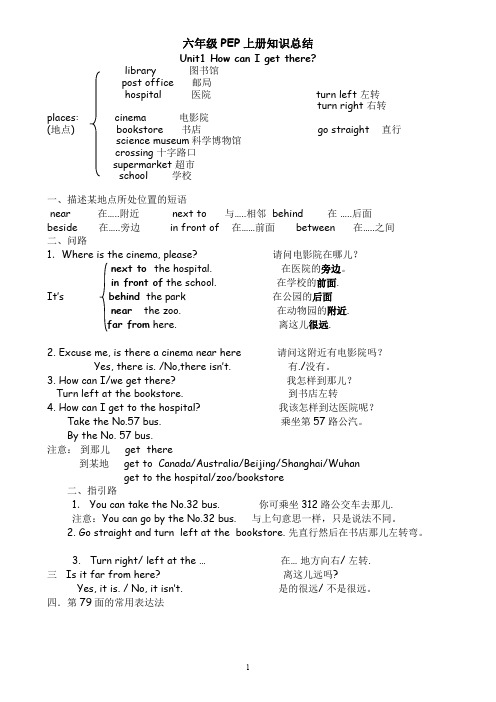
六年级PEP上册知识总结Unit1How can I get there?library图书馆post office邮局hospital医院turn left左转turn right右转places:cinema电影院(地点)bookstore书店go straight直行science museum科学博物馆crossing十字路口supermarket超市school学校一、描述某地点所处位置的短语near在…..附近next to与…..相邻behind在…..后面beside在…..旁边in front of在……前面between在…..之间二、问路1.Where is the cinema,please?请问电影院在哪儿?next to the hospital.在医院的旁边。
in front of the school.在学校的前面.It’s behind the park在公园的后面near the zoo.在动物园的附近.far from here.离这儿很远.2.Excuse me,is there a cinema near here请问这附近有电影院吗?Yes,there is./No,there isn’t.有./没有。
3.How can I/we get there?我怎样到那儿?Turn left at the bookstore.到书店左转4.How can I get to the hospital?我该怎样到达医院呢?Take the No.57bus.乘坐第57路公汽。
By the No.57bus.注意:到那儿get there到某地get to Canada/Australia/Beijing/Shanghai/Wuhanget to the hospital/zoo/bookstore二、指引路1.You can take the No.32bus.你可乘坐312路公交车去那儿.注意:You can go by the No.32bus.与上句意思一样,只是说法不同。
人教版六年级英语上册知识点归纳 Unit3一般将来时的表达方法

一般将来时的五种表达方法一般将来时1)am/is/are/going to + do和will/shall + doshall用于第三人称单数,常被will 所代替,二者都可以缩写成'll。
will 在陈述句中用于各人称,在征求意见时常用于第二人称。
Which paragraph shall I read first.Will you be at home at seven this evening?2) be going to +动词原形或地点,表示将来。
a. 主语的意图,即将做某事。
What are you going to do tomorrow?b. 计划,安排要发生的事。
The play is going to be produced next month。
c. 有迹象要发生的事。
Look at the dark clouds, there is going to be a storm.3) be +不定式表将来,按计划或正式安排将发生的事。
We are to discuss the report next Saturday.4) be about to +不定式,意为马上做某事。
He is about to leave for Beijing.注意:be about to 不能与tomorrow, next week 等表示明确将来时的时间状语连用。
一般将来时1.一般将来时的基本概念一般将来时表示将来某一时刻的动作或状态,或将来某一段时间内经常的动作或状态。
一般将来时由助动词shall(第一人称),will(第二、三人称)+动词原形构成。
美国英语则不管什么人称,一律用will。
2.一般将来时的形式●will 常简略为'll,并与主语连写在一起,如:I'll,he'll,it'll,we'll,you'll,they'll。
六年级上册英语第二单元常用表达法
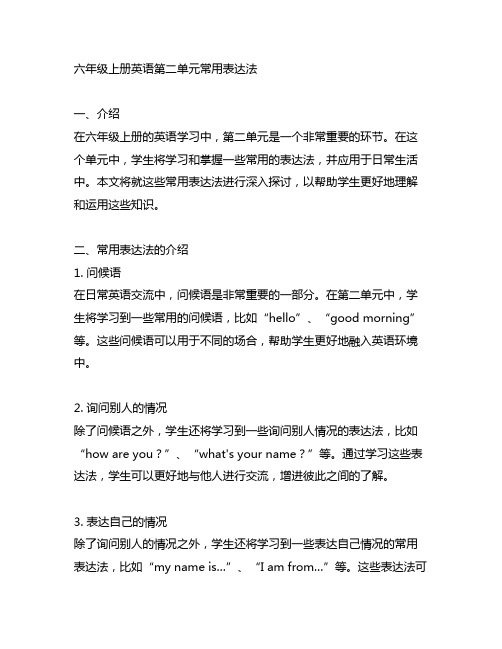
六年级上册英语第二单元常用表达法一、介绍在六年级上册的英语学习中,第二单元是一个非常重要的环节。
在这个单元中,学生将学习和掌握一些常用的表达法,并应用于日常生活中。
本文将就这些常用表达法进行深入探讨,以帮助学生更好地理解和运用这些知识。
二、常用表达法的介绍1. 问候语在日常英语交流中,问候语是非常重要的一部分。
在第二单元中,学生将学习到一些常用的问候语,比如“hello”、“good morning”等。
这些问候语可以用于不同的场合,帮助学生更好地融入英语环境中。
2. 询问别人的情况除了问候语之外,学生还将学习到一些询问别人情况的表达法,比如“how are you?”、“what's your name?”等。
通过学习这些表达法,学生可以更好地与他人进行交流,增进彼此之间的了解。
3. 表达自己的情况除了询问别人的情况之外,学生还将学习到一些表达自己情况的常用表达法,比如“my name is…”、“I am from…”等。
这些表达法可以帮助学生更好地介绍自己,增强自信心。
4. 感谢和道歉感谢和道歉是人际交往中非常重要的一部分。
在第二单元中,学生将学习到一些常用的感谢和道歉的表达法,比如“thank you”、“I'm sorry”等。
通过学习这些表达法,学生可以更好地与他人相处,建立良好的人际关系。
5. 表达喜好和爱好在第二单元中,学生还将学习到一些表达喜好和爱好的表达法,比如“I like…”、“I enjoy…”等。
这些表达法可以帮助学生更好地表达自己的兴趣爱好,与他人交流共鸣。
三、总结回顾通过本文的介绍,我们对六年级上册英语第二单元的常用表达法有了更深入的了解。
这些常用表达法不仅可以帮助学生更好地与他人交流,还可以增强学生的自信心和人际交往能力。
在学习英语的过程中,我们应该重视这些表达法的学习和应用。
四、个人观点和理解对我个人来说,学习这些常用表达法对于提高英语交流能力非常重要。
(完整版)新版PEP人教版三至六年级常用表达法
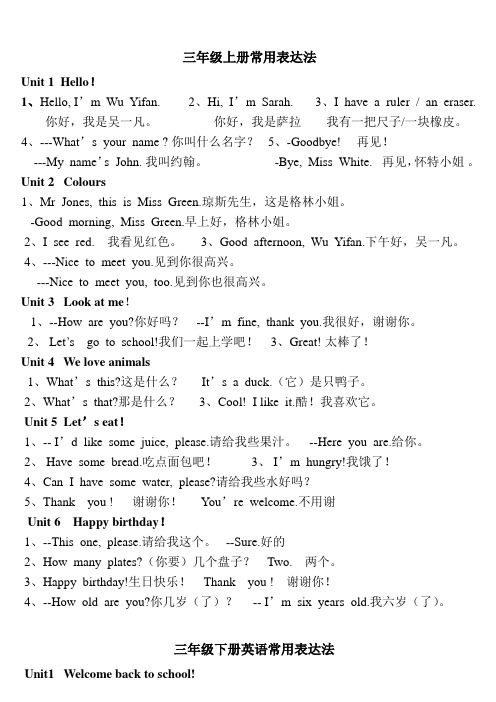
三年级上册常用表达法Unit 1 Hello!1、Hello, I’m Wu Yifan.2、Hi, I’m Sarah.3、I have a ruler / an eraser.你好,我是吴一凡。
你好,我是萨拉我有一把尺子/一块橡皮。
4、---What’s your name ? 你叫什么名字? 5、-Goodbye! 再见!---My name’s John. 我叫约翰。
-Bye, Miss White. 再见,怀特小姐。
Unit 2 Colours1、Mr Jones, this is Miss Green.琼斯先生,这是格林小姐。
-Good morning, Miss Green.早上好,格林小姐。
2、I see red. 我看见红色。
3、Good afternoon, Wu Yifan.下午好,吴一凡。
4、---Nice to meet you.见到你很高兴。
---Nice to meet you, too.见到你也很高兴。
Unit 3 Look at me!1、--How are you?你好吗? --I’m fine, thank you.我很好,谢谢你。
2、 Let’s go to school!我们一起上学吧!3、Great! 太棒了!Unit 4 We love animals1、What’s this?这是什么? It’s a duck.(它)是只鸭子。
2、What’s that?那是什么?3、Cool! I like it.酷!我喜欢它。
Unit 5 Let’s eat!1、-- I’d like some juice, please.请给我些果汁。
--Here you are.给你。
2、 Have some bread.吃点面包吧!3、 I’m hungry!我饿了!4、Can I have some water, please?请给我些水好吗?5、Thank you ! 谢谢你!You’re welcome.不用谢Unit 6 Happy birthday!1、--This one, please.请给我这个。
六年级上册英语常用表达法 -回复

六年级上册英语常用表达法 -回复以下是六年级上册英语常用表达法:1. 问候语和介绍自己:- Good morning/afternoon/evening!(早上/下午/晚上好!)- Hello! My name is [你的名字].(你好!我的名字是...)- Nice to meet you!(很高兴见到你!)2. 询问和回答个人信息:- What's your name?(你叫什么名字?)- How old are you?(你多少岁?)- Where are you from?(你来自哪里?)- I am [你的名字].(我叫...)- I am [年龄] years old.(我...岁)- I am from [你的国家/城市].(我来自...)3. 询问和描述外貌特征:- What do you look like?(你长什么样子?)- I have [描述外貌特征] hair/eyes.(我的头发/眼睛是...颜色的)- He/She has [描述外貌特征] hair/eyes.(他/她的头发/眼睛是...颜色的)4. 询问和描述爱好:- What do you like doing?(你喜欢做什么?)- I like [描述爱好].(我喜欢...)- He/She likes [描述爱好].(他/她喜欢...)5. 询问和描述家庭成员:- How many people are there in your family?(你家有几口人?)- I have [家庭成员数量] people in my family.(我家有...口人)- He/She has [家庭成员数量] people in his/her family.(他/她家有...口人)- This is my [家庭成员的关系].(这是我的...)6. 表达时间和日期:- What day is it today?(今天星期几?)- What's the date today?(今天几号?)- Today is [星期几].(今天是...)- It's the [日期].(今天是...号)7. 询问和回答学科和课程:- What's your favorite subject?(你最喜欢的科目是什么?)- My favorite subject is [科目名].(我最喜欢的科目是...)- I am good at [科目名].(我擅长...)8. 打电话:- Hello! May I speak to [对方的名字] please?(你好!我可以和...通话吗?)- Can I take a message?(我能替你传个口信吗?)9. 道别语:- Goodbye!(再见!)- See you later!(后会有期!)- Take care!(保重!)希望对你有所帮助!。
六年级上册常用表达法

六年级上册常用表达法
以下是六年级上册常用的表达法:
1、询问姓名:What's your name?
2、询问年龄:How old are you?
3、表达感谢:Thank you.
4、表达道歉:I'm sorry.
5、表达喜好:I like sth. / I love sth. / I don't like sth.
6、询问时间:What time is it?
7、询问日期:What's the date today?
8、询问位置:Where is sth?
9、表达建议:You should do sth.
10、表达请求:Can I do sth?
11、表达数量:There are sth.
12、表达将来时间:Will do sth. in the future.
13、表达正在进行的时间:I'm doing sth. now.
14、表达已经完成的时间:I have done sth.
15、表达正在发生的事情:I'm doing sth. now.
16、表达建议和劝告:You should / shouldn't do sth. It's a good idea to do sth.
17、表达请求和许可:May I do sth? Yes, you can. No, you can't.
18、表达数量和数量关系:There are / is sth in / on / near / behind / under sth.
这些表达法都是英语学习中常见的,掌握这些常用的表达法,可以帮助你更好地理解和运用英语。
六年级上册英语常用表达法1至6单元

六年级上册英语常用表达法1至6单元一、重点短语:by plane 坐飞机by ship 坐轮船on foot步行by bike 骑自行车by bus 坐公共汽车by train 坐火车trafficlights 交通灯traffic rules交通规则go to school 去上学get to 到达get on上车get off下车Stop at a red light. 红灯停Wait at a yellow light. 黄灯等Go at a green light. 绿灯行二、重点句型:1.How do you go to school?你怎么去上学?ually I go to school on foot.Sometimes I go by bus.通常我步行去上学。
有时候骑自行车去。
3.How can I get to Zhongshan Park ?我怎么到达中山公园?4.You can go by the No. 15 bus. 你可以坐15路公共汽车去。
三、重点语法:1、There are many ways to go somewhere.到一个地方去有许多方法。
这里的ways一定要用复数。
因为there are是There be句型的复数形式。
2、on foot 步行。
乘坐其他交通工具大都可以用介词by…,但是步行只能用介词on 。
4、go to school的前面绝对不能加the,这里是固定搭配。
5、USA 和US 都是美国的意思。
另外America也是美国的意思。
6、go to the park 前面一定要加the. 如果要去的地方有具体的名字,就不能再加the ,如果要去的地方没有具体名字,都要在前面加the. (go to school除外。
)7、How do you go to…?你怎样到达某个地方?如果要问的是第三人称单数,则要用:How does he/she…go to …?。
六年级上册英语常用语表达法

六年级上册英语常用语表达法1. How can I get there? (我咋能到那儿呢?)比如说你想去个好玩的地方,就可以这么问别人咋走。
2. Turn left/right at the... (在……往左/右转)这就像给你指方向的小秘籍,比如“Turn right at the supermarket. ”(在超市那儿右转。
)3. Where is the...? (……在哪儿?)当你找不着某个地方,像书店、公园啥的,就可以这么问“Where is the bookstore?”(书店在哪儿?)4. What are you going to do tomorrow? (你明天打算干啥?)要是想知道小伙伴明天的计划,就这么开口问。
5. I'm going to... (我打算……)比如“I'm going to see a film. ”(我打算去看个电影。
)6. When are you going? (你啥时候去?)关心一下别人出行的时间。
7. Where are you going? (你要去哪儿?)好奇别人的目的地,就这么问。
8. How do you go to school? (你咋去上学?)可以问问同学是走路、骑车还是坐公交上学。
9. Usually, I go by... (通常,我乘……去)“Usually, I go by bike. ”(通常,我骑自行车去。
)10. Sometimes I go by... (有时候我乘……去)像“Sometimes I go by bus. ”(有时候我坐公交去。
)。
新人教(PEP)六年级英语上册单词及常用表达汇总

新人教(PEP)六年级英语上册单词及常用表达汇总词汇表Unit11. science [ˈsaɪəns] n. 科学2. museum [mju:ˈziəm] n. 博物馆3. post office 邮局4. bookstore [ˈbʊkstɔː(r)] n. 书店5. cinema [ˈsɪnəmə] n. 电影院6. hospital [ˈhɒspɪtl] n. 医院7. crossing [ˈkrɒsɪŋ] n. 十字路口8. turn [tɜːn] v. 转弯9. left [left] 左10. straight [streɪt] adj. 笔直地11. right [raɪt] n. 右12. ask [ɑːsk] v. 问13. sir [sɜː(r)] n.(对男子的礼貌称呼)先生14. interesting [ˈɪntrəstɪŋ] adj. 有趣的15. Italian [ɪˈtæliən] adj. 意大利的16. restaurant [ˈrestrɒnt] n. 餐馆17. pizza [ˈpiːtsə] n. 比萨饼18. street [striːt]n. 大街;街道19. get [ɡet]vt.& vi. 到达20. GPS [ˌdʒi: ˈpi: ˈes] abbr. 全球(卫星)定位系统21. gave [ɡeɪv] v.(give的过去式)提供;交给22. feature [ˈfiːtʃə(r)] n. 特点23. follow [ˈfɒləʊ] vt.& vi. 跟着24. far [fɑː(r)] adv. 较远的25. tell [tel] v. 告诉Unit21. on foot 步行2. by [baɪ] prep. (表示方式)乘3. bus [bʌs] n. 公共汽车4. plane [pleɪn] n. 飞机5. taxi [ˈtæksi] n. 出租汽车6. ship [ʃɪp] n. (大)船7. subway [ˈsʌbweɪ] n. 地铁8. train [treɪn] n. 火车9. slow [sləʊ] adj. 慢的10. down [daʊn] a dv. 减少;降低11. slow down 慢下来12. stop [stɒp] v. 停下13. Mrs 夫人14. early [ˈɜːli] adv. 早到的15. helmet [ˈhelmɪt] n. 头盔16. must [mʌst] v. 必须17. wear [weə(r)] v. 戴18. attention [əˈtenʃn] n. 注意19. pay attention to 注意20. traffic [ˈtræfɪk] n. 交通21. traffic lights 交通信号灯22. Munich ['mju:nɪk] n. 慕尼黑(德国城市)23. Germany [ˈdʒɜːməni] n. 德国24. Alaska [əˈlæskə] n.阿拉斯加州(美国州名)25. sled [sled] n. 雪橇26. fast [fɑːst] adj. 快的27. ferry [ˈferi] n. 轮渡28. Papa Westray 帕帕韦斯特雷岛29. Scotland ['skɔtlənd] n. 苏格兰Unit31. visit [ˈvɪzɪt] vt. 拜访2. film [fɪlm] n. 电影3. see a film 看电影4. trip [trɪp] n. 旅行5. take a trip 去旅行6. supermarket [ˈsuːpəˌmɑːkɪt] n. 超市7. evening [ˈiːv nɪŋ] n. 晚上;傍晚8. tonight [təˈnaɪt] adv.&n. 在今晚9. tomorrow [təˈmɒrəʊ] n. 明天10. next week 下周11. dictionary ['dɪkʃən(ə)rɪ] n. 词典12. comic [ˈkɒmɪk] adj. 滑稽的13. comic book (儿童的)连环画册14. word [wɜːd]n. 单词15. word book 单词书16. postcard [ˈpəʊstkɑ: d]n. 明信片17. lesson [ˈlesn] n. 课18. space [speɪs] n. 太空19. travel [ˈtrævl] n. (尤指长途)旅行20. half [hɑːf] adj.&pron. 一半21. price [praɪs] n. 价格22. Mid-Autumn Festival 中秋节23. together [təˈɡeðə] adv. 一起24. get together 聚会25. mooncake ['mu:nkeik] n. 月饼26. poem [ˈpəʊɪm] n. 诗;27. moon [muːn] n. 月亮Unit41. studies [ˈstʌdɪz] v.(study的第三人称单数形式)学习2. puzzle [ˈpʌzl] n. 谜3. hiking [ˈhaɪkɪŋ] n. 远足4. pen pal 笔友5. hobby [ˈhɒbi] n. 业余爱好6. jasmine ['dʒæzmɪn] n. 茉莉7. idea [aɪˈdɪə] n. 想法;主意8. Canberra [ˈkænbərə] n. 堪培拉(澳大利亚首都)9. amazing [əˈmeɪzɪŋ] adj. 令人惊奇的10. shall [ʃəl;ʃæl] modal v. 表示征求意见11. goal [gəʊl] n. 射门12. join [dʒɔɪn] v. 加入13. club [klʌb] n. 俱乐部14. share [ʃeə] v. 分享,共用Unit51. factory [ˈfæktri] n. 工厂2. worker ['wɜ:kə(r)] n. 工人3. postman [ˈpəʊstmən] n. 邮递员4. businessman ['bɪznɪsmən] n. 商人;企业家5. police officer 警察6. fisherman [ˈfɪʃə(r)mən] n. 渔民7. scientist [ˈsaɪəntɪst] n. 科学家8. pilot [ˈpaɪlət] n. 飞行员9. coach [kəʊtʃ] n. 教练10. country [ˈkʌntri] n. 国家11. head teacher 校长12. sea [siː] n. 大海13. stay [steɪ] vi. 保持14. university [ˌjuːnɪˈvɜːsəti] n. 大学15. gym [dʒɪm] n. 体育馆16. if [ɪf] conj. 如果17. reporter [rɪˈpɔ:tə] n. 记者18. use [juːz] v. 使用19. type [taɪp] vt.& vi. 打字20. quickly [ˈkwɪkli] adv. 迅速地21. secretary [ˈsekrətri] n. 秘书Unit61. angry [ˈæŋɡri] adj. 生气的2. afraid [əˈfreɪd] adj. 害怕3. sad [sæd] adj. 难过的4. worried [ˈwʌrid] adj. 担心的,发愁的5. happy [ˈhæpi] adj. 高兴的6. see a doctor 看病7. wear [weə] v. 穿8. more [mɔː(r)] adj. 更多的9. deep [diːp] adj. 深的10. breath [breθ] n. 呼吸11. take a deep breath 深深吸一口气12. count [kaʊnt] v. 数数13. count to ten 数到十14. chase [tʃeɪs] v. 追赶15. mice [maɪs] n. ( mouse的复数) 老鼠16. bad [bæd] adj. 邪恶的;坏的17. hurt [hɜːt] v.(使)受伤18. ill [ɪl] adj. 有病;不舒服19. wrong [rɒŋ]adj. 有毛病20. should [ʃʊd] v. 应该21. feel [fi:l] v. 觉得;感到22. well [wel] adj. 健康;身体好23. sit [sɪt] v. 坐24. grass [ɡrɑːs]n. 草坪;25. hear [hɪə(r)] v. 听见26. ant [ænt] n. 蚂蚁27. worry [ˈwʌri] v. 担心;担忧28. stuck [stʌk] v. 陷住;无法移动29. mud [mʌd] n. 泥30. pull [pʊl] v. 拉;拽31. everyone [ˈevriwʌn] pron. 每人常用表达法:Unit1Where is the museum shop? 博物馆的商店在哪儿?It’s near the door. 在大门附近。
(完整版)新版PEP小学英语六年级词汇表(含常用表达法和不规则动词)
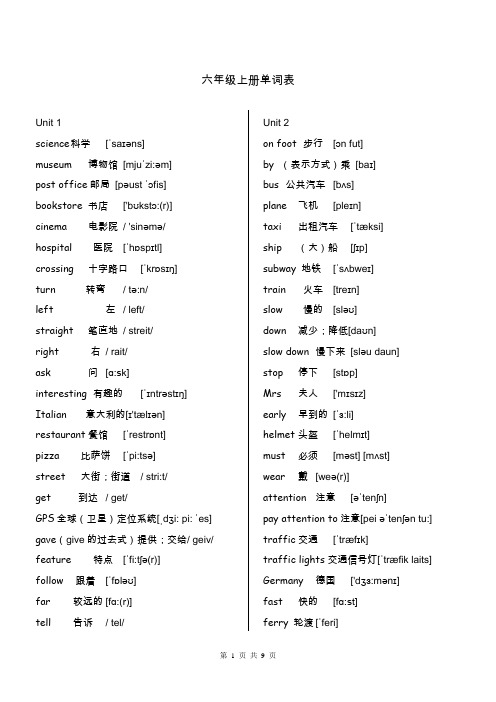
六年级上册单词表Unit 1science科学[ˈsaɪəns]museum博物馆[mjuˈzi:əm]post office邮局[pəust ˈɔfis] bookstore书店['bʊkstɔ:(r)] cinema电影院/ 'sinəmə/ hospital 医院[ˈhɒspɪtl] crossing十字路口[ˈkrɒsɪŋ]turn转弯/ tə:n/left 左/ left/straight笔直地/ streit/right右/ rait/ask 问[ɑ:sk]interesting 有趣的[ˈɪntrəstɪŋ] Italian意大利的[ɪ'tælɪən] restaurant餐馆[ˈrestrɒnt]pizza比萨饼[ˈpi:tsə]street大街;街道/ stri:t/get 到达/ get/GPS全球(卫星)定位系统[ˌdʒi: pi: ˈes] gave(give的过去式)提供;交给/ geiv/ feature 特点[ˈfi:tʃə(r)]follow跟着[ˈfɒləʊ]far较远的 [fɑ:(r)]tell 告诉/ tel/ Unit 2on foot步行[ɔn fut]by(表示方式)乘[baɪ]bus 公共汽车[bʌs]plane飞机[pleɪn]taxi 出租汽车[ˈtæksi]ship(大)船[ʃɪp]subway地铁[ˈsʌbweɪ]train火车[treɪn]slow慢的[sləʊ]down减少;降低[daʊn]slow down慢下来[sləu daun]stop停下[stɒp]Mrs夫人['mɪsɪz]early早到的[ˈɜ:li]helmet头盔[ˈhelmɪt]must必须[məst] [mʌst]wear戴[weə(r)]attention注意[əˈtenʃn]pay attention to注意[pei əˈtenʃən tu:] traffic交通[ˈtræfɪk]traffic lights交通信号灯[ˈtræfik laits] Germany德国['dʒɜ:mənɪ]fast快的[fɑ:st]ferry 轮渡 [ˈferi]Munich 慕尼黑(德国城市)['mju:nɪk] Alaska 阿拉斯加州(美国州名)[əˈlæskə] sled 雪橇[sled]PaPa Westray 帕帕韦斯特雷岛Scotland苏格兰['skɒtlənd]Unit 3visit 拜访[ˈvɪzɪt]film电影[fɪlm]see a film看电影[si: ə film]trip旅行[trɪp]take a trip去旅行[teɪk ə trɪp] supermarket超市[ˈsu:pəmɑ:kɪt] evening 晚上;傍晚[ˈi:vnɪŋ]tonight在今晚[təˈnaɪt]tomorrow明天[təˈmɒrəʊ]next week下周[nekst wi:k] dictionary 词典dictionarycomic滑稽的[ˈkɒmɪk]comic book [ˈkɔmik buk](儿童的)连环画册word 单词[wɜ:d]word book单词书postcard明信片[ˈpəʊstkɑ:d]lesson 课[ˈlesn]space太空[speɪs]travel(尤其长途)旅行[ˈtrævl]half一半[hɑ:f]price价格[praɪs] Mid-autumn Festival[mɪd ˈɔ:təm ˈfestɪvl] 中秋节together一起[təˈgeðə(r)]get together聚会[ɡet təˈɡeðə] mooncake月饼['mu:nkeɪk]poem诗[ˈpəʊɪm]moon月亮[mu:n]Unit 4studies ['stʌdɪz](study的第三代称单数形式)学习puzzle谜[ˈpʌzl]hiking远足[ˈhaɪkɪŋ]pen pal 笔友[ˈhaɪkɪŋ]hobby业余爱好[pen pæl]idea想法;主意[aɪˈdɪə]amazing令人惊奇的 [əˈmeɪzɪŋ] shall表示征求意见[ʃəl]goal射门[gəʊl]join加入[dʒɔɪn]club俱乐部[klʌb]share分享[ʃeə(r)]Canberra['kænbərə]堪培拉(澳大利亚首都)Unit 5factory工厂[ˈfæktri]worker 工人[ˈwɜ:kə(r)]postman邮递员[ˈpəʊstmən] businessman[ˈbɪznəsmæn]商人;企业家police officer警察[pəˈli:s ˈɔfisə] fisherman渔民[ˈfɪʃəmən] scientist科学家[ˈsaɪəntɪst] pilot飞行员[ˈpaɪlət]coach教练[kəʊtʃ]country 国家[ˈkʌntri]head teacher校长[hed ˈti:tʃə] sea 大海[si:]stay保持[steɪ] university大学[ˌju:nɪˈvɜ:səti] gym体育馆[dʒɪm]if如果[ɪf]reporter记者[rɪˈpɔ:tə(r)] use使用[ju:s]type 打字[taɪp]quickly快速地[ˈkwɪkli] secretary秘书[ˈsekrətri]Unit 6angry生气的[ˈæŋgri]afraid害怕[əˈfreɪd]sad 难过的[sæd]worried 担心的;发愁的[ˈwʌrid] happy高兴的[ˈhæpi]see a doctor看病[si: əˈdɔktə] wear穿[weə(r)] more更多的[mɔ:(r)]deep深的[di:p]breath呼吸[breθ]take a deep breath[teik ədi:p breθ]深深吸一口气count数数[kaʊnt]count to ten数到十[kaʊnt]chase追赶[tʃeɪs]mice(mouse的复数)老鼠/ mais/ bad邪恶的;坏的[bæd]hurt(使)受伤[hɜ:t]ill有病;不舒服[ɪl]wrong 有毛病[rɒŋ]should应该[ʃʊd]feel 觉得;感到[fi:l]well 健康;身体好[wel]sit坐[sɪt]grass草坪[grɑ:s]hear听见[hɪə(r)]ant 蚂蚁[ænt]worry 担心;担忧[ˈwʌri]stuck 陷住;无法移动[stʌk]mud 泥[mʌd]pull 拉;拽 [pʊl]everyone 每人[ˈevriwʌn]六年级英语上册常用表达法Unit1-- Where is the museum shop?博物馆的商店在哪儿?--It`s near the doo.r 在大门附近--How can we get there?我们怎么到那儿?--Turn left at the bookstore. 到书店左转Unit2-- How do you come to school?你怎么来学校的?--Usually, I come on foot.通常我走路来In the USA people on bikes must wear one.在美国骑自行车的人必须戴头盔Don’t go at the red light! 别闯红灯I must pay attention to the traffic lights.我必须注意交通信号灯Unit3--What are you going to do tomorrow?你明天打算做什么?--I’m going to have an art lesson.我要上美术课We’re going to draw some pictures in Renmin Park.我们要到人民公园去画画--Where are you going? 你们打算去哪儿?--We’re going to the cinema.我们打算去电影院 When are you going? 你们什么时候去?Unit4--What are Peter `s hobbies?彼得有什么爱好?--He likes reading stories 他喜欢读故事--Does he live in Sydney? 他住在悉尼吗?--No, he doesn’t 不,他没有--Does he like doing word puzzles and going hiking? 他喜欢猜字谜和远足吗?--Yes, he does 是的,他喜欢Unit5--What does he do? 他是做什么的?--He is a businessman. 他是商人--Where does he work? 他在哪儿工作?-- He works at sea. 他在海上工作。
新版PEP人教版三至六年级常用表达法

三年级上册常用表达法Unit 1 Hello!1、Hello, I’m Wu Yifan.2、Hi, I’m Sarah。
3、I have a ruler / an eraser.你好,我是吴一凡。
你好,我是萨拉我有一把尺子/一块橡皮.4、-——What’s your name ?你叫什么名字?5、-Goodbye!再见!--—My name's John. 我叫约翰. -Bye, Miss White. 再见,怀特小姐。
Unit 2 Colours1、Mr Jones, this is Miss Green。
琼斯先生,这是格林小姐。
-Good morning, Miss Green。
早上好,格林小姐。
2、I see red。
我看见红色。
3、Good afternoon, Wu Yifan。
下午好,吴一凡.4、---Nice to meet you.见到你很高兴。
—-—Nice to meet you, too.见到你也很高兴。
Unit 3 Look at me!1、——How are you?你好吗? -—I’m fine, thank you。
我很好,谢谢你。
2、 Let’s go to school!我们一起上学吧!3、Great!太棒了!Unit 4 We love animals1、What’s this?这是什么? It’s a duck.(它)是只鸭子.2、What's that?那是什么?3、Cool! I like it.酷!我喜欢它。
Unit 5 Let’s eat!1、-— I’d like some juice, please。
请给我些果汁。
——Here you are.给你。
2、 Have some bread。
吃点面包吧!3、 I’m hungry!我饿了!4、Can I have some water, please?请给我些水好吗?5、Thank you ! 谢谢你! You're welcome。
六年级上册英语句型
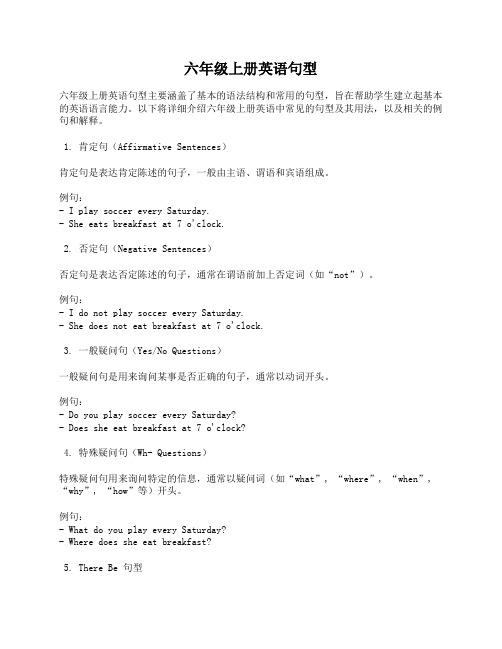
六年级上册英语句型六年级上册英语句型主要涵盖了基本的语法结构和常用的句型,旨在帮助学生建立起基本的英语语言能力。
以下将详细介绍六年级上册英语中常见的句型及其用法,以及相关的例句和解释。
1. 肯定句(Affirmative Sentences)肯定句是表达肯定陈述的句子,一般由主语、谓语和宾语组成。
例句:- I play soccer every Saturday.- She eats breakfast at 7 o'clock.2. 否定句(Negative Sentences)否定句是表达否定陈述的句子,通常在谓语前加上否定词(如“not”)。
例句:- I do not play soccer every Saturday.- She does not eat breakfast at 7 o'clock.3. 一般疑问句(Yes/No Questions)一般疑问句是用来询问某事是否正确的句子,通常以动词开头。
例句:- Do you play soccer every Saturday?- Does she eat breakfast at 7 o'clock?4. 特殊疑问句(Wh- Questions)特殊疑问句用来询问特定的信息,通常以疑问词(如“what”, “where”, “when”, “why”, “how”等)开头。
例句:- What do you play every Saturday?- Where does she eat breakfast?5. There Be 句型There Be 句型用于描述某地方存在某物或某种情况。
例句:- There is a cat on the table.- There are five apples in the basket.6. 情态动词句型(Modal Verbs)情态动词用于表示可能性、许可、能力等。
新版PEP小学英语六年级上册1-6单元知识点总结

六年级PEP上册知识总结Unit1 How can I get there?library 图书馆post office 邮局hospital 医院turn left 左转 turn right 右转places: cinema 电影院(地点) bookstore 书店go straight 直行 science museum科学博物馆crossing 十字路口supermarket 超市school 学校一、描述某地点所处位置的短语near 在…..附近next to 与…..相邻beside 在…..旁边in front of 在……前面behind 在…..后面between 在…..之间二、问路1.Where is the cinema, please? 请问电影院在哪儿?next to the hospital. 在医院的旁边。
in front of the school. 在学校的前面.behind the park 在公园的后面It’s near the zoo. 在动物园的附近.far from here. 离这儿很远.2. Excuse me, is there a cinema near here 请问这附近有电影院吗?Yes, there is. /No,there isn’t. 有./没有。
3. How can I/we get there? 我怎样到那儿?Turn left at the bookstore. 到书店左转4. How can I get to the hospital? 我该怎样到达医院呢?Take the No.57 bus. 乘坐第57路公汽。
By the No. 57 bus.注意:到那儿 get there到某地 get to Canada/Australia/Beijing/ Shanghai/Wuhan get to the hospital/zoo/bookstore二、指引路1. You can take the No.32 bus. 你可乘坐312路公交车去那儿.注意:You can go by the No.32 bus. 与上句意思一样,只是说法不同。
六年级上册英语常用表达法

六年级上册英语常用表达法Unit 1 How can I get there?--Where is the museum shop?博物馆商店在哪里--It's near the door.在大门附近。
--How can we get there?我们怎么到哪儿--Turn left at the bookstore.到书店左转。
Unit 2 Ways to go to school--How do you come to school?你怎么来学校的--Usually,I come on foot.通常我走路来。
In the USA people on bikes must wear one. 在美国,骑自行车的人必须带头盔。
Don't go at the red light!别闯红灯!I must pay attention to the traffic lights.我必须注意交通信号灯!Unit 3 My weekend plan--What are you going to do tomorrow?你明天打算做什么--I'm going to have an art lesson.我要上美术课。
--We are going to draw some pictures in Renmin Park.我要到人民公园去画画。
--Where are you going?你们打算去哪儿-- We are going to the cinema.我们打算去电影院。
--When are you going ?你们什么时候去Unit 4 I have a pen pal--What are Peter's hobbies?彼得有什么爱好--He likes reading stories.他喜欢读故事。
--Does he live in Sydney?他住在悉尼吗--No,he doesn't不,他没有。
- 1、下载文档前请自行甄别文档内容的完整性,平台不提供额外的编辑、内容补充、找答案等附加服务。
- 2、"仅部分预览"的文档,不可在线预览部分如存在完整性等问题,可反馈申请退款(可完整预览的文档不适用该条件!)。
- 3、如文档侵犯您的权益,请联系客服反馈,我们会尽快为您处理(人工客服工作时间:9:00-18:30)。
六年级上册英语常用表达法
Unit 1
How can I get there?
--Where is the museum shop? 博物馆商店在哪里?
--It's near the door. 在大门附近。
--How can we get there? 我们怎么到哪儿?
--Turn left at the bookstore. 到书店左转。
Unit 2
Ways to go to school
--How do you come to school? 你怎么来学校的?
--Usually, I come on foot. 通常我走路来。
In the USA people on bikes must wear one.
在美国,骑自行车的人必须带头盔。
Don't go at the red light! 别闯红灯!
I must pay attention to the traffic lights. 我必须注意交通信号灯!
Unit 3
My weekend plan
--What are you going to do tomorrow? 你明天打算做什么?
--I'm going to have an art lesson. 我要上美术课。
--We are going to draw some pictures in Renmin Park. 我要到人民公园去画画。
--Where are you going? 你们打算去哪儿?
-- We are going to the cinema. 我们打算去电影院。
--When are you going ? 你们什么时候去?
Unit 4
I have a pen pal
--What are Peter's hobbies? 彼得有什么爱好?
--He likes reading stories. 他喜欢读故事。
--Does he live in Sydney? 他住在悉尼吗?
--No, he doesn't, 不,他没有。
--Does he like doing word puzzle and going hiking? 他喜欢猜字谜和远足吗?
-- Yes, he does. 是的,他喜欢。
Unit 5 What does he do?
--What does he do ? 他是做什么的?
--He's a businessman. 他是商人。
--Where does he work? 他在哪儿工作?
--He works at sea. 他在海上工作。
-- How does he go to work? 他怎么上班?
--He goes to work by bike. 他骑自行车上班。
Unit 6 How do you feel?
They are afraid of him. 他们害怕他。
The cat is angry with them. 这只猫很生他们的气。
--What's wrong? 怎么了?
--Your father is ill. 你爸爸病了。
--He should see a doctor this morning. 他今天早上应该去看病。
Don't be sad. 别伤心。
六年级下册英语常用表达法
Unit 1
How tall are you?
That's the tallest dinosaur in this hall . 那是这个厅里最高的恐龙。
It's taller than both of us together . 它比我们俩加起来还高。
---How tall are you ? 你有多高?
---I'm 1.65 metres. 我身高1.65 米。
---What size are your shoes , Mike ? 迈克,你穿多大号的鞋?
---Your feet are bigger than mine. My shoes are size 37. 你的脚比我的大。
我穿37号的鞋。
---How heavy are you ? 你体重多少?
---I'm 48 kilograms. 我体重48公斤。
Unit2
Last weekend
---How was your weekend ? 你周末过得怎么样?--- It was good, thank you. 很好,谢谢。
---What did you do ? 你(周末)干什么了?
---I stayed at home with your grandma. We drank tea in the aft ernoon and watched TV. 我和你奶奶待在家里。
我们喝了下午茶,还看了电视。
---Did you do anything else ? 你还做了其他什么事吗?
---Yes, I cleaned my room and washed my clothes. 是的,我打扫了房间,还洗了衣服。
I want to buy the new film magazine. 我想买期新的电影杂志。
---What did you do last weekend ? Did you see a film? 你上周末干什么了?你看电影了吗?
---No, I had a cold. I stayed at home all weekend and slept. 没有,我感冒了。
整个周末都待在家里睡觉。
Unit 3 Where did you go?
What happened ? 怎么了?
---Are you all right ? 你还好吧?
--- I'm OK now. 我现在没事了。
Where did you go ? 你去哪儿了?
It looks like a mule ! 它看起来像头骡子!
---Did you go to Turpan ? 你们去吐鲁番了吗?
---Yes, we did. 是的,去了。
---How did you go there ? 你们怎么去的?
---We went there by plane. 我们坐飞机去的。
---Sounds great! 听上去不错!
Unit 4
Then and now
There was no library in my old school. 我以前的学校里没有图书馆。
Tell us about your school , please. 请给我们讲讲您的学校吧。
How do you know that ? 你怎么知道的?
There were no computers or Internet in my time. 我那时候没有电脑也没有网络。
Before, I was quiet . Now I'm very active in class. 以前我很安静。
现、I was short, so I couldn't ride my bike well. Now, I go cycling every day. 我以前个子小,自行车骑得不好。
现在我天天骑车。
